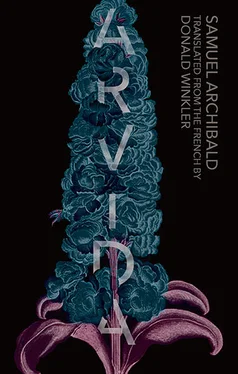“I want one, too.”
I called forth a wood spider, with her right breast as the abdomen, and drew its fine sparassid legs from her bosom’s thin flesh. Meanwhile Misaka thrust her face between her legs, and Azumi, without anyone having to say anything, went down on her knees behind Misaka and dipped two fingers, soon dripping wet, into her cleft.
In no time at all, women were arriving from the village and the entire peninsula, to be sculpted. This beauty Misaka and I had invented was now walking the streets, given prominence by the spouses’ strategically perforated dresses, and the dismayed ugliness of the husbands.
Oh, you have every right to turn the page and declare that it’s all a bad dream in which Misaka and I drift about like shadows behind curtains. But I have the right to defy you, to tell you to lift the bedclothes in the dawn hours, to accustom your eyes to the half-light without waking your loved one, and to swear to me that you know the meaning of every tattoo on her body, and the origin of every burn.
The men say:
We made an enormous mistake by sending Mabuto’s wife to the Inoué domain, and the horror that ensued was immeasurable. The repugnant mutilations that Misaka and Reiko inflicted on flesh became a fashion, an uncontainable compulsion, an enchantment, and there was no way to break the spell, not in reasoning with the wives, or in crying after them, or in trying to shake them out of their torpor, or by beating them. We were at least able to make them talk, but their accounts were all the more shocking in that we knew each one was keeping many details to herself.
They said that Misaka and Reiko were lovers. That they embraced by touching their foreheads together, merging their lidless gazes, and licking, each in turn, the other’s gums and teeth. They said that Misaka ate glass. That she crushed electric light bulbs, which she had brought from the mainland, in her hands, and swallowed them one by one, like candies, the splinters stained with blood. She mixed them with flower petals and shari rice. Later, there flowed from between her legs a rose-coloured liquid she offered to the women like a serving for a meal, one they said was as delicate as the raw flesh of a fish. They also said that withered and solitary women come from nowhere asked for their bodies to be entirely sculpted, and that the renegades had buried their martyred remains behind the property, below the hills.
We would have wanted to treat these stories as simple tales, and we would doubtless have succeeded in doing so, if these mutilated wives, sometimes amputated and blinded, had not strolled through the village streets in greater and greater numbers to display their wounds like brand new silk kimonos.
Misaka says:
According to the renegades, the men complained that from beyond the palisade there reached their ears cries of desolation and death. Say what they liked, the men indeed heard guttural sounds of an alien nature, rollicking belly to belly with the cries of pain that issued from the villa. Something was cavorting in company with the pain, mating with it inside the shared cries, something that, being so intimate with pain, showed itself to be even more shocking. The men knew perfectly well what it was, but they had no name for it, and even if they’d had one, they would under no circumstances have pronounced it.
They did have one, however, to designate the demons of Christian lands, and they set themselves to covering the Inoué property’s walls with red paint:
悪魔
When the renegades told me about it and asked me what they should do, I told them to leave the ideograms where they were on the palisade, and to call me from now on by my chosen name, Akuma.
5
Once, once only, Misaka says:
Long before this day, the last day, I took Reiko in my arms, as in the beginning, when she was only a child. I embraced her, and afterwards I said:
“My love, the flesh that grows over what is cut is new flesh. Perhaps for this reason, precisely, something awaits us at the end of art that is not death. Perhaps our work is a work of life, perhaps when our bodies will be nothing but open wounds we will be reborn anew, like two twin sisters. Perhaps in the end a million scars will leave our skin as smooth as that of a newborn.”
Reiko looked at me with sadness, and replied:
“You’re wrong, Misaka. You’re as wrong as you can be. None of us is born without scars. We are created by the meeting of flesh and flesh, we are the fruit of one only, but we remain coiled like a voracious tumour in her belly, until we are torn from her breast and the thread is cut that binds us to her. There will be no return to the beginning, beautiful sensei. We are brought into this world by the steel of a blade, Misaka, and you and I are born each day a bit more.”
One last time, Reiko says:
I never mutilated my tongue. Pleasure without pain is just a masquerade, but we must keep intact those parts that can give pleasure, because without it pain is only pain. You can cut off your fingers with big pruning shears, but you have to conserve at least one to penetrate the cunt up to the womb, you can amputate one foot with a hacksaw, but you have to keep the other to press it against the loved one’s cleft when your hands are otherwise engaged, you can lop off toes with a chisel, but you have to keep at least one stump to suck, you can rip off eyelids, make holes in lips, and slice off earlobes, but you always have to take care of your tongue, to treat well the only tongue you own, as it’s precious and doesn’t easily heal.
Without it, you wouldn’t be able to say that I’m lying, that two women would never do all that we’ve done, and that we are only paper ghosts, unable to suffer or bleed. Without it, I could turn my back on you as I am doing now, and go silent as I soon will, but I would not have been able to accomplish, on this next to last day, the one thing I’d refused myself up to that point.
On the night before the last day, in the darkness, over the muffled laughter of the renegades playing cards on the floor above, I told Misaka that I loved her.
In the end, the men say:
We’d screwed up our courage for a whole year, we’d saved up and armed ourselves with guns bought on the mainland, with rusted blades and clubs. We knew they wouldn’t prevail against the renegades, but we counted on our numbers and on our conviction that deep within themselves, the ronins and the gaijins must also have felt that this madness had to end. Even the wives no longer visited the Inoué property. Because we’d ordered them not to, of course, because they almost all had their own sculptures now, it was true, but also, and we knew it even if they refused to admit it, because they were afraid of Akuma and Reiko. They had seen things there about which they did not want to speak, they’d known women who had chosen to remain with the mistresses and who had never emerged from the property, they’d understood that all that was but horror, and they had returned to their duties and to reason. The children could bear witness to those horrors, those who had seen the graves dug below the property.
We crossed the village in a large pack, our lights troubling the darkness, battered the gate open with a sledgehammer and crowbars, and began to scale the slope leading to the house. At first we thought it was aflame. A pyre was burning in front of it, a gigantic bonfire loosing into the night air a stench of grease, wood, and solvent, and beyond which our eyes, dazzled, could not make out the structure of a house intact. We thought at first that the house itself was burning, and we saw ten black silhouettes loom up between us and the flames. We all felt a frigid chill run up our spines, we loaded our guns, unsheathed our blades, and closed our fingers around our staffs, tight enough to crack our joints. The renegades’ silhouettes shrank the more they drew away from the fire and came near to us, but their giant shadows danced with the flames and stretched out across the ground as far as the soles of our shoes.
Читать дальше












